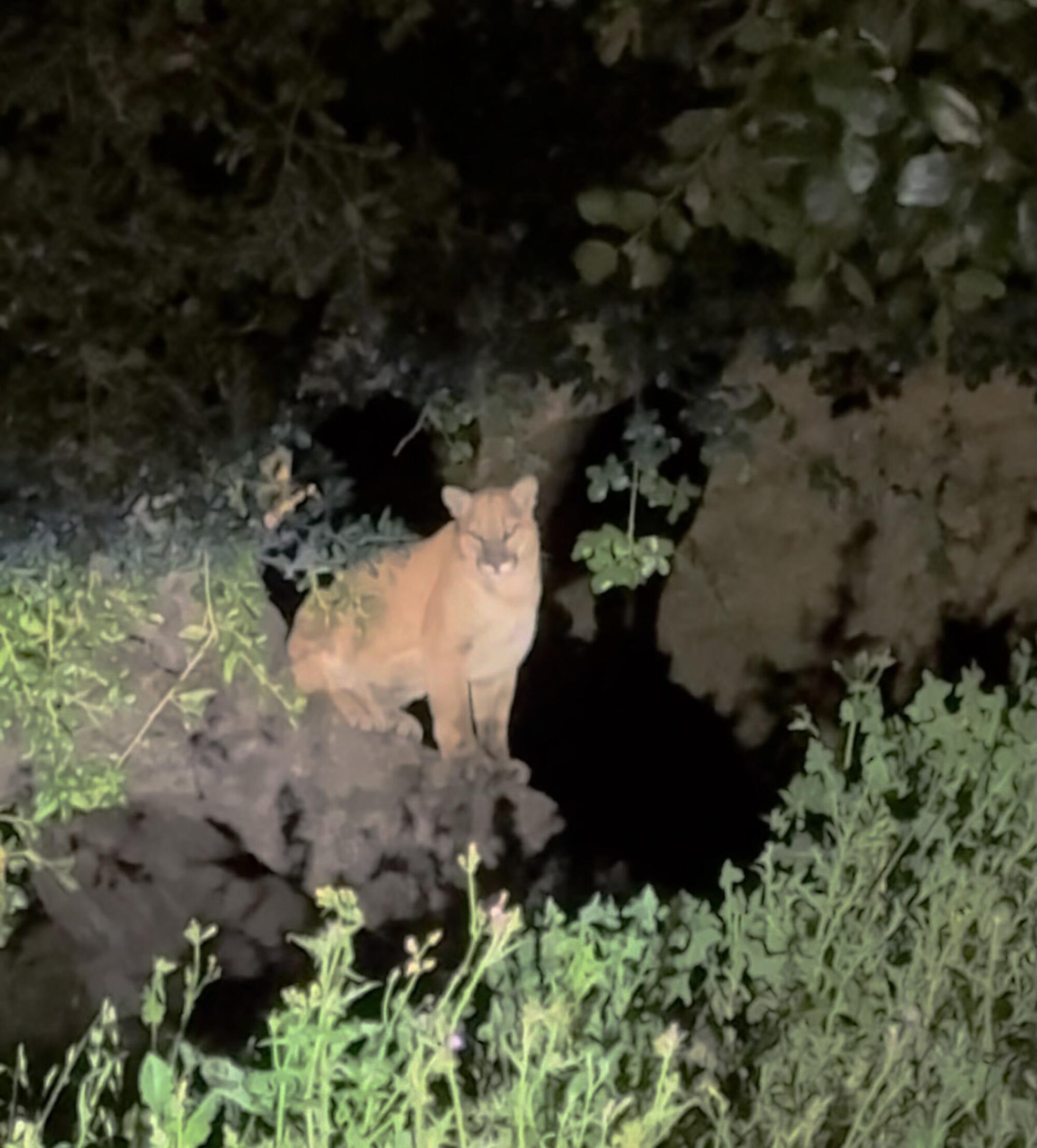
A mountain lion spotted at the edge of Griffith Park this spring spurred excitement — and concern — among Angelenos invested in the region’s hulking feline inhabitants.
Would he stay and become the successor to celebrity puma P-22, who reigned over the green space in the heart of Los Angeles for a decade?
Wildlife officials believe the lion instead probably ventured out and was killed by a car over the summer — another grim conjecture big cat fans feared would come to pass.
It’s likely that the blonde lion was the same cat that was found dead on the 405 Freeway near the Getty Center on the Fourth of July, scientists with the National Park Service told The Times.
The deceased lion was found up against the median on the northbound, or east, side of the notoriously congested freeway, suggesting he may have come from the east — where the Santa Monica Mountains stretch from the 405 to their eastern edge in Griffith Park — according to Seth Riley, wildlife branch chief for the Santa Monica Mountains National Recreation Area, a unit of the park service.
“We’ll never know for sure, right? But it could well have been the case,” Riley said.
Park service biologist Jeff Sikich said “it likely is” the same lion.
For 22 years, the park service has studied mountain lions in and around the Santa Monica Mountains. Sikich manages field work for the project and is considered an expert on lions in the region.

Vehicle strikes are the top killer of mountain lions in the study area. Since the study began, at least 46 lions have died from car crashes in the region, and the puma found dead on the 405 was the second to perish on a Southern California freeway in a month.
In mid-May, Hollywood Hills resident Vladimir Polumiskov shot video of a lion perched on the low-angled stump of a tree near the northwestern corner of the roughly 4,200-acre park.
Los Angeles did a collective double take. It was surprising when P-22 hunkered down in the urban wilderness 12 years ago. Getting to the park required crossing perilous freeways, and it’s a teeny territory by lion standards.
But he remained there for a decade, until 2022, when he was captured and euthanized due to injury and infection.
Now it seemed a new puma was following in his pawsteps. The young-leaning male wasn’t collared and therefore couldn’t be tracked. But scientists hoped to change that, and add him to their ongoing study.
A camera network that had been active when P-22 prowled Griffith Park was redeployed, and within a week photos were snapped of what officials said was the same lion.
Then the trail went cold. They never caught him on camera again.
Less than two months later, a lion that appeared to be the same size and age was found dead on the 405.
The lion’s likely death marks the fulfillment of concern many expressed in light of the urban perils he faced. The headline for an editorial The Times published in the wake of his discovery summed it up: “Looks like there’s a new mountain lion in Griffith Park. Let’s try not to kill him.”
Beth Pratt, California regional executive director for the National Wildlife Federation, said she cried a little when she found out about the lion’s probable fate. From the get-go, she was worried about his safety.
“I was like, really? The poor guy,” said Pratt, a vocal advocate for Southland lions.
“It just shows how P-22 beat the odds, right?” she said of the lion who earned influencer status during his lifetime — and beyond. He inspired a campaign to save local lions, and P-22 Day is celebrated annually in L.A.
P-22 is presumed to have risked life and limb to get into the park, by crossing the 405 and 101 freeways. But once he moved in and was collared, he didn’t leave.

Pratt believes the new cat was coming and going from the park.
“His luck was gonna run out, which it did, which is really sad,” she said.
Cars pose a direct threat to pumas of the Santa Monica Mountains, and the freeway system also isolates them from other lion populations.
Local cats have begun to show signs of inbreeding from the lack of genetic diversity, including kinked tails. Research has shown they could go locally extinct in less than 50 years if their situation doesn’t improve.
Some see a massive wildlife crossing rising over the 101 Freeway as a critical lifeline.
The lions — living in the only range to bisect a major metropolitan area — could land on the state’s endangered species list, along with several other cut-off clans in the state.
In 2020, the California Fish and Game Commission made six lion clans a candidate for protection under the state Endangered Species Act, and are expected to decide whether to permanently list them next year.